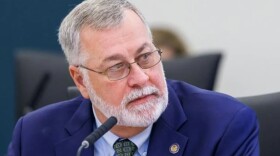-
The legislation extends the fund until the end of 2027, but Democrats take issue with how it's been used for immigration enforcement actions and say it needs stronger oversight.
-
A Florida bill that has momentum this legislative session would put Abraham Lincoln and George Washington portraits in a "conspicuous" location in all public schools.
-
Albritton said in a memo to senators Wednesday morning that he will receive care for recurring blood clots but that tests did not show a heart abnormality
-
A Florida bill would allow licensed drivers to use UTVs on two-lane county and city roads with posted speed limits under 55 miles per hour.
-
The voucher legislation passed unanimously on Wednesday, a couple of months after an audit found a "myriad of accountability challenges that left a statewide funding shortfall and a system where funding did not follow the child.”
-
Dr. Ralph Massullo won by 18 points in a district that includes Citrus, Hernando, Sumter and a portion of Pasco. The position opened in July, when Blaise Ingoglia was appointed state CFO.
-
Boyd served in the House from 2010 to 2018 before getting elected in 2020 to the Senate, where he serves as majority leader. He will succeed President Ben Albritton, R-Wauchula, after the 2026 elections.
-
During a meeting of the Florida Senate's Appropriations Committee on Higher Education Wednesday, Chair Gayle Harrell said that budget difficulties will likely lead to cuts.
-
Boyd, who is the Senate majority leader, will succeed President Ben Albritton, R-Wauchula, after the November 2026 elections.
-
The Republican-led panel could make Florida's Republican-favoring congressional map even more Republican.
-
A Sept. 9 special election will either determine the new Tampa City Council District 5 representative — or cut down the field to two candidates who would face off in an Oct. 28 runoff.
-
The largest proposals seek compensation from the Department of Children and Families. Many of the bills have been proposed in past years but have not been approved.
Play Live Radio
Next Up:
0:00
0:00
Available On Air Stations











